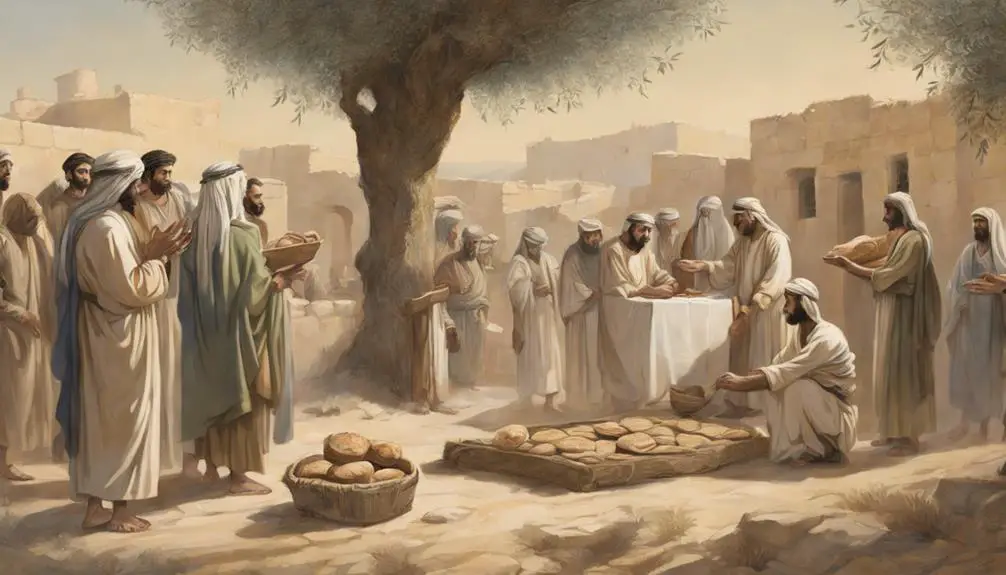Contemplate the profound biblical wisdom on generosity and its relevance in today's world; the secret lies in 2 Corinthians 9:7.

A Bible Verse That Say About Giving to Others
Just as the earth generously yields its fruits, the Bible offers a bounty of wisdom on the virtue of giving.
One such verse, 'Each of you should give what you have decided in your heart to give, not reluctantly or under compulsion, for God loves a cheerful giver' (2 Corinthians 9:7), speaks volumes about the nature of generosity. It's not just about the act of giving, but the intent behind it.
But what exactly does it mean in today's context? Let's dissect this, shall we?
Key Takeaways
- Proverbs 19:17 emphasizes cheerful giving, rooted in the heart rather than obligation or compulsion.
- Generosity is not just charity but a mechanism for community support and a timeless biblical call to emulate God's compassion.
- The verse advocates giving beyond material wealth, including time, talents, and emotions, for personal and societal impact.
- Real-life stories of giving can illustrate the practical application of biblical principles, serving as demonstrations of faith, compassion, and selflessness.
Understanding the Verse

To truly embrace the spirit of generosity highlighted in the Bible, it's essential that you delve into the deeper meaning behind these verses. When you read verses such as Proverbs 19:17, 'Whoever is kind to the poor lends to the LORD, and he'll reward them for what they've done', it's not just about literal lending and reward. It's a metaphorical representation of God's divine reciprocity.
Grasp the theological perspective here. The verse suggests that when you're generous, you're not merely giving to the needy, but you're actually lending to God. In the divine economy, God doesn't owe anyone, but He chooses to reward generosity, showing His appreciation and approval of our actions.
Historical Context of the Verse

In delving into the historical context of Proverbs 19:17, you'll find that it's steeped in the cultural and social practices of ancient Israel where generosity wasn't only a personal virtue but also a societal expectation. This verse was written during a time when Israel was a theocratic society, meaning they believed God was their ultimate ruler. Their laws and customs, therefore, reflected this God-centric worldview.
The society was agrarian with a heavy reliance on community cooperation. The concept of giving wasn't merely about charity, it was a mechanism for maintaining societal equilibrium. Those who'd more were expected to support those less fortunate as a means of ensuring community survival. This was a reflection of God's commandments and His emphasis on justice and mercy.
In the context of Proverbs 19:17, the giver is lending to God, a statement that underscores the sanctity of giving. It's a potent testament to the weight the ancient Israelites placed on generosity, framing it not just as an earthly act, but as a spiritual one – a direct interaction with the divine. In understanding this historical context, the verse's message becomes even more profound.
The Verse's Message on Generosity

Understanding the historical context of Proverbs 19:17 can deepen your appreciation for its profound message on generosity. This verse, nestled in the wisdom literature of the Old Testament, asserts, 'Whoever is kind to the poor lends to the Lord, and He'll reward them for what they've done.' It's a powerful reminder of God's concern for those in need and His expectation that you, as His follower, emulate His compassion and generosity.
The verse's message cuts to the heart of the theological concept of stewardship. You're not merely giving to others; you're lending to the Lord. It emphasizes that your wealth and possessions aren't truly yours, but God's, entrusted to you to manage wisely and charitably.
Moreover, this verse implies a divine promise of reward – not necessarily material, but spiritual. It's an assurance that your acts of generosity won't go unnoticed by God. It's not that you give to receive, but that in giving, you align yourself with God's will, opening doors to blessings beyond measure. This understanding can inspire you to live out the biblical call to generosity.
Applying the Verse to Modern Life

Applying Proverbs 19:17 to your modern life requires a heart-check, challenging you to reflect on your attitude towards giving and the way you use your resources. This verse doesn't merely talk about physical giving; it's also about emotional, spiritual, and time investment in others. It's urging you to think beyond money.
Consider your talents and time. Are you sharing these with others? Are you investing in people's lives in meaningful ways? As you ponder these questions, you'll realize the verse's relevance in today's world. It's not outdated; it's timeless.
Crucially, the verse insists on giving with a cheerful heart, not out of obligation or for recognition. It's about cultivating a genuine spirit of generosity where giving becomes a joy, not a chore. The verse also promises a reward from God, not necessarily in this life, but in eternity.
In the modern context, this is a call to action to be mindful and intentional with your giving. It's about recognizing that every act of giving, no matter how small, has a ripple effect in the world. This biblical principle of giving to others isn't just a religious mandate; it's a powerful tool for personal transformation and social change.
Real-Life Stories of Giving

Reflecting on Proverbs 19:17 and its implications can be deepened by exploring real-life stories of giving, as they offer tangible examples of this biblical principle in action. One such story is of a woman who anonymously paid off layaway items for struggling families during Christmas. Her act of kindness wasn't about recognition, but rather about obeying God's command to give generously.
In another incident, a man noticed a homeless person shivering in the cold and gave him his own warm jacket. He didn't have much himself, but he adhered to the teachings of the Bible, understanding that giving to the poor is lending to the Lord.
These stories reflect individuals who've imbibed the essence of Proverbs 19:17, realizing that their acts of generosity were more than just charitable deeds – they were investments in their spiritual storehouse. Their giving was an act of faith, a tangible expression of their belief in God's promises.
In essence, real-life acts of giving are profound demonstrations of biblical teachings. They're not just about the act itself, but about the underlying faith, compassion, and selflessness that the act symbolizes.
Conclusion
So, you've seen how the verse from 2 Corinthians 9:7 urges us to give generously and cheerfully. It's no historical accident, but a timeless call to kindness.
Generosity isn't just about material gifts, it's about giving love, time, and compassion. Applying this verse to your life can lead to profound changes and blessings.
Remember, the real-life stories of giving are countless. Truly, 'God loves a cheerful giver.' Let's strive to be one.



Sign up